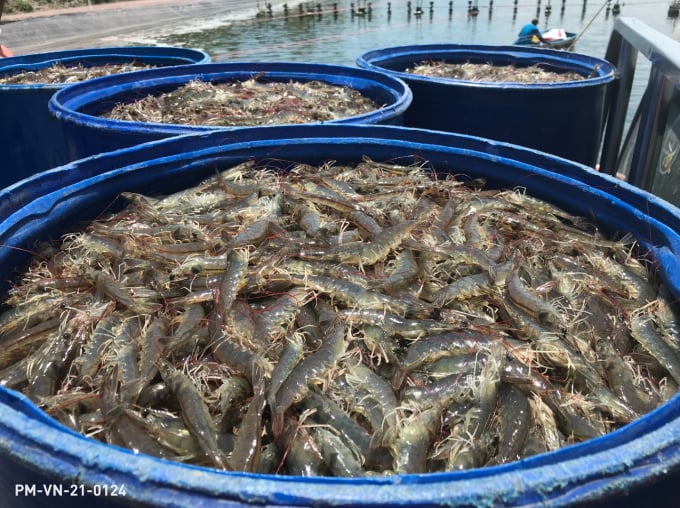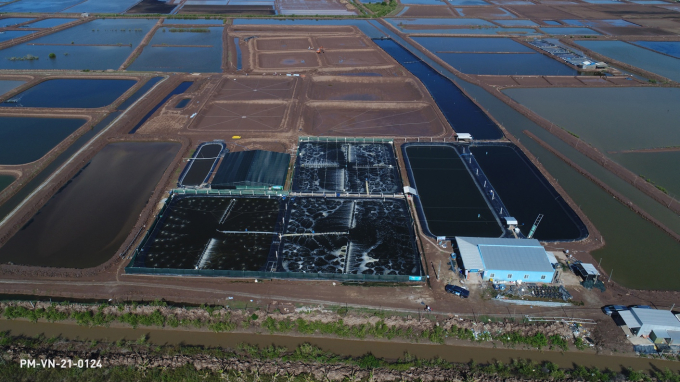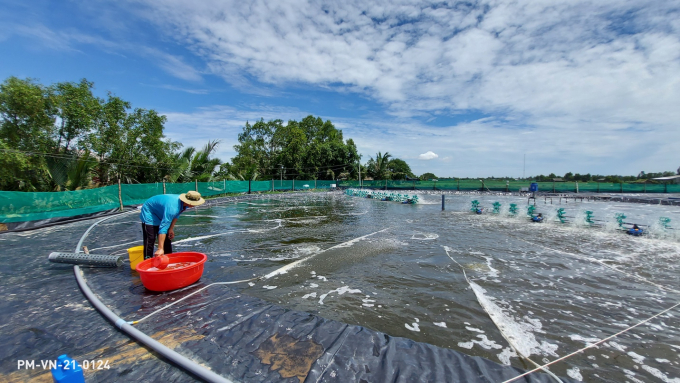November 25, 2025 | 06:43 GMT +7
November 25, 2025 | 06:43 GMT +7
Hotline: 0913.378.918
November 25, 2025 | 06:43 GMT +7
Hotline: 0913.378.918

Farmers in Mekong River Delta harvest shrimps at the end of the season.
Shrimp farmers in the southwestern of Vietnam used to worry when the harvest season approached. While many have been discouraged and quit their job, some others have harvested success thanks to timely application of a new model.
Vietnam is currently one of the largest shrimp exporting countries in the world. In 2019, the country had 720,000 hectares of shrimp farming, producing the total output of nearly 750,000 tons of shrimp.
Following such general development, shrimp farming in the Mekong River Delta has also become more and more popular. More local farmers have invested in expanding ponds, buying shrimp hatchery and applying modern technology in order to harvest bumper shrimp season.
However, many objective factors like climate change, environmental pollution and COVID-19 pandemic in recent years have caused many challenges to shrimp farming in the region.
Furthermore, the profession is also facing fierce competition in the markets. Many shrimp farmers have confessed that they feel uncertain about the success when the price of shrimp has constantly gone down and that they could not control objective factors.
Many shrimp farmers in the Mekong River Delta therefore have thought of giving up. Farmer Yem from Ben Tre Province said that his two shrimp farms could yield a profit of VND 150-200 million per season but in some seasons, he did not earn anything. Similarly, the three hectare shrimp farm of farmer Vu from Bac Lieu Province barely brought him any profit in five consecutive seasons.

The aerial view of Elanco Demo Farm model.
Two years ago, shrimp farmers in the Mekong River Delta started to apply the Elanco Demo Farm model, a sustainable shrimp farming process launched by Elanco Company based on understanding the difficulties of shrimp farmers in the region.
Elanco Demo Farm puts into practice 3 sets of procedures: biosafety, microbiology and nutrition.
In particular, the biosecurity process is paid more attention to increase the success rate. Combined with farm disinfecting products and equipment, it helps to clean the water supply, recycle water and prevent the discharge of waste directly into the environment.
In addition, the microbiological processes Proquatic® PondPlus and Proquatic® PondDtox of Elanco Demo Farm provide a source of microorganisms that are 2 to 3 times higher than normal to supply to the pond and resolve large amounts of organic matter from food and waste.
Elanco Demo Farm model is applied with a number of special products to help stabilize and quickly improve the shrimp farming environment and limit negative impacts from the outside environment.
In addition, the water source is also cleaned with specialized products and sterilized by a new generation complex of iodine complex Iodine Solution, in addition to essential mineral supplements for shrimp after molting.
The shrimp is fed with machines to minimize the amount of wasted food and enable them to grow faster and more evenly during each season.
The most highlighted feature of Elanco Demo Farm is the application of modern 4.0 technology into the management and monitoring of shrimp ponds that helps to evaluate more accurately, manage more methodically and support farmers in giving more proper decisions
Only after a few months, the Elanco Demo Farm model has completely changed the mindset and life of shrimp farmers in the region. Presently, the model has been applied widely, creating continuous bumper shrimp seasons and marking a big step in the development of the Mekong River Delta shrimp farming.
After applying Elanco Demo Farm, farmer Yem harvested nearly 12 tons of shrimp after 85 days, earning a profit of VND 700 million. He has succeeded in nine consecutive seasons of shrimp farming.
At the same time, he has also encouraged many other farmers to apply this model who have also harvested success beyond expectations.

Yem’s shrimp farms apply Elanco Demo Farm model.
Meanwhile, farmer Vu also earned a profit of VND 500 million with 4 consecutive successful seasons after 3 months of applying the Elanco Demo Farm. Presently, he has applied this model with all of his 12 shrimp ponds.
Many other farmers in the Mekong River Delta have also found success by applying the model. The special feature of this model is bringing fast but sustainable success and high profit, in accordance with the motto of Elanco Demo Farm “The faster the application - The closer the success ".

(VAN) The information was shared at the seminar 'Urban Agriculture - Solutions for Developing Green Spaces,' organized by the Kinh te & Do thi Newspaper and the Biotechnology Center of Ho Chi Minh City.
/2025/11/19/4141-2-132831_216.jpg)
(VAN) One of Japfa's outstanding solutions is implementing digital transformation and artificial intelligence (AI) to optimize operations, enhance productivity, and advance sustainable development.
/2025/11/19/4847-1-093540_448.jpg)
(VAN) The Gia Lai Provincial People’s Committee had a working session with the delegation of the U.S. Department of Agriculture, the State of Idaho, and representatives of the State's leading enterprises.

(VAN) Ca Mau has a sufficient foundation to become a strong regional aquaculture center, where production integrates the economy, the environment, and the lives of the people.

(VAN) SEIKI Group envisions itself as a pioneer in the ‘dual transformation’ of digital technology and green industry, standing alongside the Government and Vietnamese businesses in their pursuit of sustainable development.

(VAN) The VNGEONET network affirms Viet Nam's progress in mastering digital space, providing a precise positioning data platform to serve socioeconomic development.
/2025/11/14/3247-1-184556_35.jpg)
(VAN) Thai Nguyen is methodically implementing digital transformation in the livestock sector, laying the foundation for a modern, transparent, and sustainable agriculture.